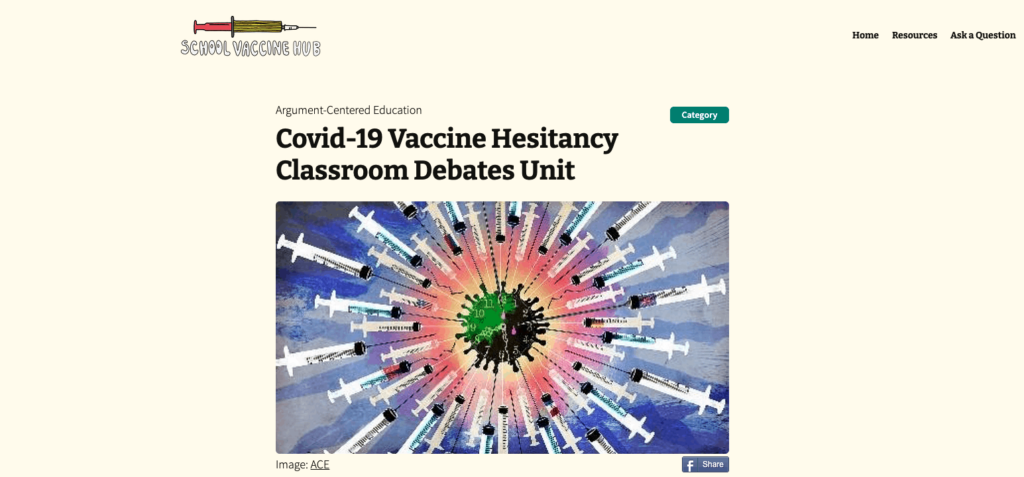School Vaccine Hub Publishes Curricular Resources for Teachers to Help Students Learn About COVID-19 Vaccine Efficacy

By Max Koltuv, Les Lynn, and Eric Tucker
As we enter the second year of the COVID-19 pandemic, building trust and confidence in the safety and reliability of the vaccination process will be a critical step toward the broad uptake of vaccines.
But persuading 330 million people is a tall order. As a society, we will need multiple strategies to encourage people to get their vaccine and reach herd immunity.
As a central point of connection for many communities, schools have an opportunity and an obligation to play a crucial role in this outreach. Armed with the right resources, schools can help build trust and confidence in their communities, starting with students in classrooms.
The School Vaccine Hub—launched by Brooklyn Laboratory Charter Schools (LAB) and EquityByDesign.org—is an important new resource to empower schools to do just this. The Hub curates high-quality resources for schools and school leaders to share content from trusted public health institutions like the Centers for Disease Control and the World Health Organization.
Importantly, the Hub also features curricular resources to engage students and inspire them to share knowledge and information with loved ones, and with the community at large. Schools can use these lesson places and resources to promote the uptake of COVID-19 vaccinations and address fears and concerns about vaccines in America’s diverse public school communities.
To access the curriculum, visit the School Vaccine Hub and filter by “Lessons” and “Curricular Resources,” including those we have curated from C-SPAN, ADL, PBS NewsHour, and Baylor. Poke around the Resource Library.
Along with our partners at Brooklyn LAB and EquityByDesign, we created these curricular resources from scratch. Under the guidance of SOAR Education Partners, we built tools that empower teachers to educate students with science-based facts about the risks of the virus and the efficacy of the vaccine.
Our goals are twofold: We want to equip students with the information and inspiration to have meaningful conversations with friends and loved ones who may be hesitant to get vaccinated. We also want to empower students to think for themselves about important social issues. To that end, our curriculum includes a mini-unit designed by Argument-Centered Education, which uses evidence-based argumentation to get students into the habit of thinking critically about complicated issues.
The SOAR curriculum currently comes in two flavors: One for middle schoolers, and another for high school. Each curriculum comprises topics for 15 45-minute lessons. Some of the topics include:
- What is COVID-19 and what do we know about it?
- How does COVID-19 compare with other historical pandemics?
- How does the virus impact the human body?
- Why are some people skeptical of vaccines?
- How has systemic racism impacted the spread of COVID-19?
Each topic includes a full lesson plan and everything an educator needs to teach the class. Each curriculum also comes with an implementation guide, advice on how to teach it, and rubrics for evaluation.
The argument-centered curriculum, which can be combined to create a four-week project, or educators can pick and choose units to cover in just over a week, is complimentary but distinct. We designed that course around an open-ended question that students can debate: Can education and communication strategies overcome Covid-19 vaccine hesitancy and ensure that enough Americans get vaccinated to achieve herd immunity?
The argument-centered curriculum encourages students to respectfully explore the root causes of disbelief and distrust in science, and it teaches them how to overcome unwarranted skepticism and to challenge disregard of medical science. With these tools, young people learn to debate about the source of widespread reliance on misinformation, and how best to assess the quality, sufficiency, and reasoning behind evidence-based claims. Together, they unpack how to understand and then, where appropriate, overcome doubt. The process often leads to expanding comfort zones—not only around open-mindedness to science but also around issues of systemic racism.
Our hope is that students are inspired to bring some of these questions home and engage in constructive discussions with their loved ones and others who might be hesitant to get a vaccine.
The team’s creators are refreshing the Hub’s content frequently to ensure the information is current and relevant. We are also adding resources to account for new issues as they come, as well as resources that address child vaccination, boosters, and other issues.
We have an opportunity to engage our students in science and empower them to help keep their loved ones and communities safe. We must teach students to think critically and compassionately and to keep an eye to the future.
For more see:
- How Schools Can Promote Vaccination and Address Hesitancy: A 10-Point Plan that Puts Equity First
- Why We Built a Hub for Vetted Vaccination Resources for Public Schools
- Meeting the Challenge of Reopening: How Laboratory School Communities Can Power Human-Centered Design and Inclusive Innovation
- How to Reopen Schools: A 10-Point Plan Putting Equity at the Center
- To Reopen, America Needs Laboratory School
- Preparing to Reopen: Six Principles That Put Equity at the Core
- Reopening Schools: A Scheduling Map for Educators to Plan the Who, What, When, Where, and How of Learning this Fall
- Schools Need a Success Coach for Every Learner
- Preparing for a Healthy and Safe Return to School: Public School Facilities Planning in the Era of COVID-19
- Educating All Learners Alliance Launches Flagship Site, Shares Personas Educators Can Use to Understand Students’ Lived Experience During COVID-19
- Five Principles to Help Provide Our School Communities With the Communications They Deserve
Max Koltuv is a principal at SOAR Education Partners. He previously served as a regional superintendent at Achievement First where he oversaw a network of 15 elementary schools across three states. Before joining Achievement First, Max oversaw all of Uncommon Schools’ Brooklyn elementary instructional leaders as the Director of Brooklyn Elementary Instruction for the Prep and Excellence networks of Uncommon Schools. Max originally joined Uncommon Schools as the Founding Head of School at Leadership Prep Bedford Stuyvesant.
Les Lynn is the founder and director of Argument-Centered Education. Since 2013, Argument-Centered Education has been helping districts, networks, administrators, and teachers become effective in organizing and implementing instruction around engaging, balanced, and arguable questions at the center of the high school and middle school curriculum.
Stay in-the-know with innovations in learning by signing up for the weekly Smart Update.
Guest Author




0 Comments
Leave a Comment
Your email address will not be published. All fields are required.